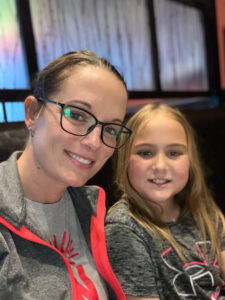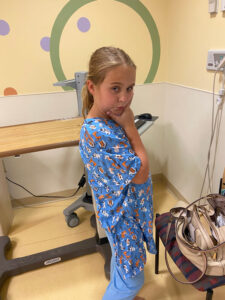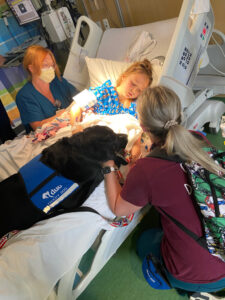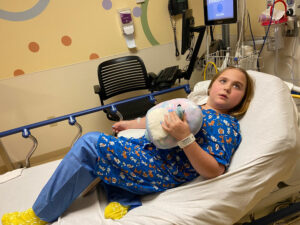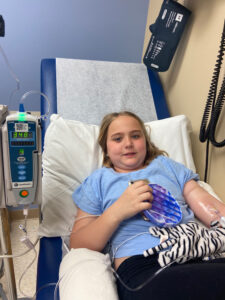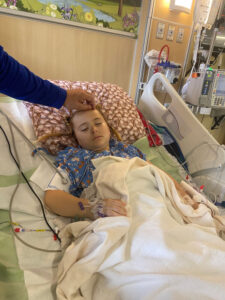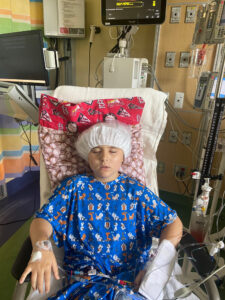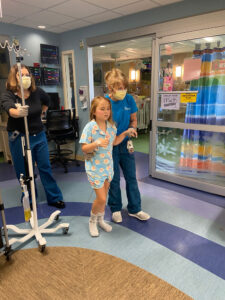Our Patients:
Libby Cunningham
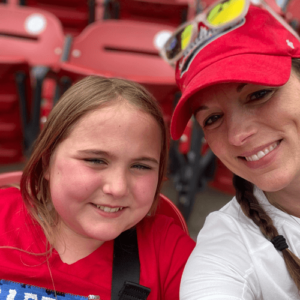
It was Good Friday of Easter weekend 2022. Eleven-year-old Libby and her mom, Michelle, from Glen Carbon, IL were having a mother/ daughter trip at the mall. Shopping and laughter were promptly interrupted when Michelle received the phone call no mother ever wants to receive. It was a call from Libby’s endocrinologist that Libby had a brain tumor.
“Libby was an incredibly active 11-year-old girl. Soccer was her life! She played on a select team with practices all the time and games every weekend. She was thriving, got good grades, and had great friends,” Michelle said. “The only odd thing in Libby’s health history was that she was measuring in the lower percentiles of the growth charts from about the age of nine,” said Michelle. “I have always been on the small size, myself, so her pediatrician and I agreed to simply monitor her and check her height every 6 months,” Michelle said. In December 2021, that decline reached a level of concern which prompted her pediatrician to recommend further evaluation. Within the few weeks prior to the phone call on Good Friday, Libby completed a full endocrine work-up – the last test of which was a brain MRI completed Thursday afternoon.
“To say I was in shock and confused is an understatement,” said Michelle. “I had worked over 20 years at Cardinal Glennon as a nurse in the Pediatric Intensive Care Unit, the Transport Team and the Post-Anesthesia Care Unit. I’ve seen the worst of the worst,” Michelle said. “It was hard enough to see these traumas happen to other people. The call was almost too surreal. I just immediately started crying.”
Libby recalls that day being a blur. “I remember being in the dressing room of the mall and Mom just started crying on the phone,” Libby said. “She told me I had a tumor and that we needed to go back to Cardinal Glennon and see more doctors.” “I didn’t really even know what a tumor was,” Libby admits. “Seeing my mom cry, I was scared and knew it was bad news – but somehow since she worked at the hospital, I felt like I would be safe and that things were going to be ok,” said Libby.
“I didn’t find out until I got home from work,” said Brad, Libby’s father. “Being an engineer, I wasn’t real sure what the news exactly meant. Of course, I googled it and the worse case scenarios popped up first. It was the longest few days of my life until we met with all the doctors to discuss our options and gameplan.”
Over the following next week, Libby had specialist appointments with neurosurgery, ophthalmology, and a CT scan of her sinuses. Libby’s tumor was suspected to be a craniopharyngioma.
Childhood craniopharyngiomas are rare tumors usually found near the pituitary gland (a pea-sized organ at the bottom of the brain that controls other glands) and the hypothalamus (a small cone-shaped organ connected to the pituitary gland by nerves). Craniopharyngiomas can affect many functions of the brain. Because of their location, they may affect the hormone making process, growth, and vision. Libby’s tumor was about the size of a cherry at the stalk of her pituitary gland and there was a large fluid-filled cyst above the tumor.
“I remember Nurse Kelly stayed with me while my parents talked a lot with the doctors about next steps. I remember them trying to explain the plan to me. It was all a little bit over my head. I’m not sure I really absorbed it with all the other tests going on so I just Googled craniopharyngioma later that night. That probably wasn’t the best thing to do, I guess, but it helped for things to start sinking in,” Libby said. “My parents told the doctors that our family had a Disney trip planned at the beginning of May. The doctors told us we could do our trip and encouraged me to finish school,” Libby said. “I’m really glad they did that because life has been really different, ever since,” said Libby.
A surgery date was set for May 27, 2022. Surgeons planned a transsphenoidal approach to Libby’s tumor removal. With transsphenoidal surgery, the instruments are inserted into part of the brain by going through an incision made at the bottom of the nose between the nostrils and then through the sphenoid bone (a butterfly-shaped bone at the base of the skull) to reach the tumor. The thin bone of the sella (the bone overlying the pituitary gland) is removed to expose the tough lining of the skull called the dura. The dura is opened to expose the tumor and pituitary gland. Through a small hole in the sella, the tumor is removed by the neurosurgeon, then the hole in the sella floor is replaced with a graft. Biologic glue is applied over the graft in the sphenoid sinus, which allows healing and prevents leaking of cerebrospinal fluid (CSF) from the brain into the sinus and nasal cavity.
Surgeons successfully got Libby’s entire tumor out. She spent 5 days in the Pediatric Intensive Care Unit with a lumbar drain for regulation of her CSF and stents in her nose to protect her graft. “Most of her time in the PICU and then on the general care unit was a new game of regulation that would become our new normal,” said Michelle. “With the stalk of Libby’s pituitary gland removed, her pituitary gland is essentially non-functional. There is no communication between her pituitary and the rest of her body.” “Her endocrine system will need to be artificially regulated the rest of her life,” Michelle said. “We were so thankful that her tumor was benign, and the surgeons got it all,” said Michelle. “But at the same time, we knew this was the beginning of a whole new lifestyle. Libby is doing great with her meds now and its just part of her every day routine.”
“I remember lying in PICU having to stay in bed with my drain and trying to be so careful not to sneeze or blow my nose,” Libby said. “As soon as someone tells you that you can’t get up or that you can’t blow your nose – that’s all you want to do and all you think about,” said Libby. “Boredom, getting poked with needles every two hours and just being away from home was hard,” Libby said. “I can’t imagine what it would’ve been like without having the Child Life specialists and Thor. “The specialists really helped by giving me plenty of things to distract me. They were somebody I could talk to, and they even let Thor just lay on my bed with me for a long time. I have a stuffed Thor they left in my room for me after his visit,” Libby said. “It’s still one of the most favorite things that I own to this day. I even think Thor convinced my Dad to get me a dog for Christmas that year. I had been begging my dad for a dog for YEARS.”
“Libby was twice as strong as us in the hospital,” added Brad. “I’m not very good with blood so brain fluid was a whole new level! I saw how much Libby loved Thor and her response to him. We’ve had our black lab mix rescue dog, Ellie for over a year now,” said Brad.
Libby was discharged on June 8, 2022, with a regimen of new medications including DDAVP, Synthroid and hydrocortisone. The pituitary gland plays a crucial role in regulating various bodily functions by producing and releasing hormones that control growth, reproduction, metabolism, stress response and other important processes. Without her pituitary gland functioning, her body would no longer receive the hormonal signals necessary to regulate these functions. At first, Libby had bloodwork done every other day. Eventually it became every three days, then weekly, then monthly. She followed up regularly with her ENT specialist, ophthalmology specialist, endocrine specialist, and brain tumor clinic.
August 2022 brought some additional challenges with the stress of Libby starting middle school. “Libby has always been a Type A personality – a high achiever with predictable anxiety,” Michelle said. “I anticipated that the changes might have an effect on her. But the new building, riding the bus and significant changes in her friend group that she didn’t expect, were just too much for her to handle,” said Michelle. “I stopped taking my meds,” Libby admitted. “I honestly wanted to disappear. I felt like all of my friends just stopped wanting to be around me after I got out of the hospital,” Libby said. “I couldn’t figure out any other reason why they avoided me. I knew I couldn’t go back to the old me, but I didn’t like the new me. I wasn’t in control anymore. But stopping my medications was something I could control.”
Michelle noticed Libby not feeling well over the stretch of a few days, and at the same time discovered that Libby had been hiding her medications. Alerted and concerned, Michelle brought Libby to the Emergency Department where she had a thorough exam and psych evaluation. Her medication doses which had finally become regulated needed to essentially start over and be completely changed. A plan for addressing her mental health also had to be determined. After discharge, Libby began seeing an outpatient psychologist twice weekly and was able to finally regulate physically and mentally with diligence over the next 6-12 months. “She is doing so well now and is as close to her old self as I can remember,” said Brad. “It was just so much for a little kid to go through at once.”
“I’ve been forced to grow up and mature a lot through this experience,” Libby said. “I’ve had to adapt to what my body can’t do anymore. I’ve had to give up the sport that I love. I’ve had to adapt to new friends and accept that everyone won’t understand or won’t WANT to understand what I’m going through. I’ve learned when I need to put an extra call into my therapist, and I’ve also learned that art, music and shopping are all great emotional therapy for me,” laughs Libby. “Things are definitely in a better place now.” “She also has a very sweet and funny little sister that adores her,” added Brad. “Aubrey has been great throughout the entire process because even when she was put on the backburner, she never complained. She always helps out and makes her sister laugh,” said Brad.
When asked about Libby’s future, Libby and her family candidly and openly face each day at a time. Libby started growth hormone therapy in July 2023. It was always the goal since she was 11 years old to begin therapy, but she had to have 1 years of tumor-free CT scans. The hope is within the next two years, the growth hormone will help her achieve her developmentally- appropriate height of 5 feet tall. She has grown two inches in the last few months, so both Libby and her parents are optimistic. Libby will also face some conversations in her future regarding reproductive health.
“Sometimes I have a hard time or a bad day thinking about how fast Libby has had to grow up,” Michelle said.” It really makes me grateful for my Glennon family,” says Michelle. “I know I have such supportive co-workers and I always feel like I’m part of a big family.” “When I think about the timing of Libby’s diagnosis, and the path of my career at Glennon, I could not have been in a better situation to manage what I needed to as her mom,” Michelle said. “Throughout my three positions on very different teams, I have grown my network of connections and support. Despite feeling so scared, I had peace knowing my connections are trusted ones …and faith and knowledge that our whole family would be in the best hands possible,” said Michelle. “The empathy I feel for parents now has multiplied beyond what I felt before Libby’s journey,” Michelle said. “I have a sincere appreciation of the importance each team member makes for a family’s experience here. Every nurse. Every resident. Every Ronald McDonald Room volunteer. Every lab tech. Every Child Life Specialists. Everyone. A child’s view of health care and a parent’s view of health care can be influenced so easily – especially if you don’t know the landscape. Though I’d never have asked for Libby to go down this road, I’m grateful for the chance to let other parents know I’ve been there ….and to give them even small moments of peace.”
You may recognize Libby as our 2024 Homers for Health patient co-chair. To make your pledge for patients like Libby, click HERE.

